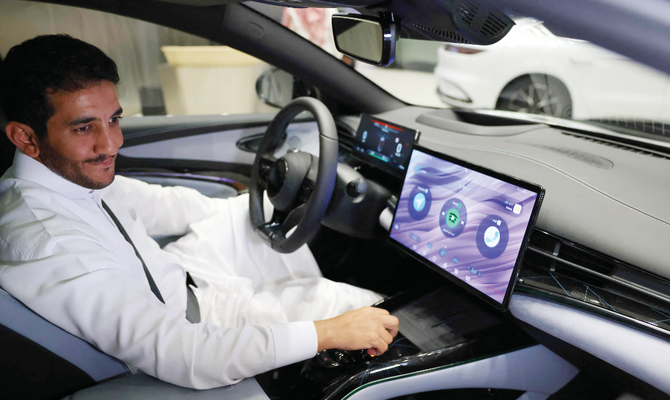
16 Mar 2025
RIYADH: Long known for its oil industry, Saudi Arabia is now racing toward an electrified future, not just for sustainability reasons, but also to get ahead in this trillion-dollar market.
With billions of dollars being poured into infrastructure, cutting-edge technology and supply chain localization, the Kingdom is making a strategic play to lead the global automotive revolution under its ambitious Vision 2030 road map.
This strategy has seen the Kingdom invest in US-based EV manufacturer Lucid through its Public Investment Fund, as well as creating its homegrown electric vehicle brand, Ceer — set to launch its first models in 2026.
Big bets and bold moves: Saudi Arabia’s investment in EVs
Saudi Arabia’s commitment to economic diversification is evident in its substantial investments in EV production and battery supply chains.
Heiko Seitz, PwC Global and Middle East eMobility leader, told Arab News that the Kingdom is prioritizing the development of a self-sufficient automotive supply chain as a key strategy to solidify its position in the global EV industry.
He added: “Through significant investments, such as $3.4 billion in Lucid Motors to produce 155,000 EVs annually and a $5.6 billion agreement with Human Horizons, the Kingdom is attracting global automakers and building a competitive manufacturing base.”
Seitz highlighted the $9 billion allocated to EV-related materials, including $900 million from EV Metals and $126 million from Ivanhoe Electric, as evidence that the Kingdom is leveraging its $2.5 trillion in untapped mineral reserves to ensure it has access to the critical resources needed for production.
Mazin Jameel, managing director of marketing operations at Abdul Latif Jameel Motors, told Arab News that Saudi Arabia is taking a comprehensive approach to boosting EV adoption by developing a widespread charging network through public and private partnerships with leading technology providers.
“These investments in charging infrastructure are complemented by large-scale renewable energy projects, including solar and wind farms, which will provide clean energy for EV charging,” said Jameel.
He added: “Additionally, the government is introducing regulatory frameworks, financial incentives and policy support to accelerate EV adoption among consumers. These steps reflect Saudi Arabia’s comprehensive approach to fostering a sustainable and future-ready transportation ecosystem.”
The Kingdom is already working on integrating artificial intelligence and automation into the automotive sector, ensuring a more efficient production process.
As part of these efforts, Saudi Arabia is fostering partnerships with global tech firms to enhance the digital infrastructure required for smart mobility solutions.
The integration of AI-driven analytics in EV production will help in optimizing supply chain management and improving vehicle efficiency, positioning Saudi Arabia at the forefront of next-generation mobility innovation.
EVs, fast chargers and a high-tech future
Saudi Arabia is not solely relying on the government to propel the EV industry forward. It is keen to work with the private sector to ensure the sector has solid foundations to blossom.
Ahmad Al-Tawbah, CEO of Motory, told Arab News that private sector expertise in technology and operations is being complemented by public investment in infrastructure, policies and incentives.